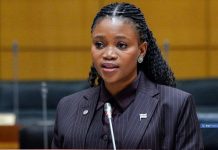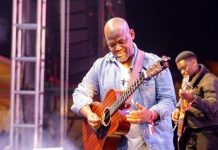Africa-Press – Botswana. The amendment of the Botswana Constitution is expected to birth a number of legislative changes that will address some of the issues raised by Batswana during the commission of inquiry in all the 57 constituencies around the country.
This was said by Minister for State President, Mr Kabo Morwaeng when he presented the Constitution (Amendment) Bill, 2024 (Bill No. 4 of 2024) before Parliament for second reading yesterday.
Minister Morwaeng said during the inquiry process, Batswana did not restrict themselves to the Constitution, but raised pertinent issues that would aid government in implementing laws.
Mr Morwaeng said the commission was mandated to assess the strengths and weaknesses of Constitution, assess its adequacy, articulate the concerns of the people of Botswana as regards the amendments that may be required and make any recommendations on its review.
“This was a first wholesome inquiry into the review of the Constitution of Botswana. Prior to this, there has been two reviews targeting specific sections of the Constitution. This is very important given that an exercise of this kind was a long way coming. I must thank Batswana for this as they have made it easy for government to address issues in our laws such as the introduction of stiffer penalties for drug lords, issues relating to bail, repeat offenders particularly in domestic violence issues among others, this was a fruitful exercise,” he said.
Over and above, he said, there were specific issues which had been decided would be taken to the public through a Referendum which included abortion, commercial sex, same sex and the death penalty.
The minister further told Parliament that the commission submitted a report to the President, Dr Mokgweetsi Masisi, with 93 recommendations out of which 31 related to the Constitution, 39 to primary legislation while 23 to policy.
“In considering the recommendations of the Commission in so far as they related to the Constitution, the recommendations if given effect and agreed to, will preserve the unity, peace and stability of the country, promote, adhere to or enhance the rule of law and separation of powers,” he added.
Furthermore, he said the recommendations would add to the adequacy of the Constitution in protecting the fundamental rights and freedoms of the individual, among other things.
Presenting the contents of the Amendment Bill, Mr Morwaeng explained that the review intended to amend the Botswana Constitution, following approval by government as well as recommendations of the Presidential Commission of Inquiry into the Review of the Constitution of Botswana.
He said some clauses of the Bill called for the rights to health, education and work to be enshrined in the Constitution.
Also, he said some clauses protected the rights to collectively bargain and strike as was required by Batswana.
“While these were already provided for under primary legislation, Batswana felt it was important that these be provided for in the supreme law of the land,” he said.
The amendment, he said also sought to protect and prohibit the discrimination of intersex persons and persons with disabilities, adding that issues of intersex persons in Botswana had not been addressed culminating in several matters which went before the courts.
Furthermore, he said intersex should not be confused with transgender and homosexuality issues.
“It is important to clarify that intersex is a term used for a variety of conditions in which a person is born with a reproductive or sexual anatomy that does not seem to fit the typical definitions of female or male. For example, a person might be born appearing to be female on the outside, but having mostly male-typical anatomy on the inside. This has led to problems for such persons in terms of assigning them the correct gender marks or even accessing services which are gender specific,” he said.
Other proposed amendments introduce measures to ensure that a retired President who had served an aggregate period of 10 years was not eligible for election in any political office.
“In their submissions, the people made it clear that the law must not have any loopholes, these clauses ensure that this is taken care of,” he said.
Further, the amendment sought to provide for transitional arrangements for the orderly transfer of executive power following the dissolution of Parliament and at the end of the term of office of the President.
This, he said, addresses issues relating to a Presidential Transition law to guide the handing over of the presidential baton.
The amendment further incorporated changes to increase the number of specially elected Members of Parliament from six to 10, who would be stripped off from holding office if they changed political allegiance after election.
The proposed amendment seeks to empower the Constitution to grant authority to Parliament to enact necessary legislation determining the criteria for selecting members of Ntlo Ya Dikgosi in a manner that is impartial and not based on tribal affiliations.
Batswana had during the commission’s consultations , expressed that there exists tribal inequality under the current sections, where certain tribes automatically gain membership to Ntlo ya Dikgosi while others are required to go through elections via an electoral college, resulting in disparities.
The aim is to achieve tribal neutrality by eliminating the need for some Ntlo ya Dikgosi members to be chosen through an electoral college, as elaborated upon. Under the new provision, membership in Ntlo ya Dikgosi will consist of two individuals from each administrative district currently performing Kgosi’s duties within that specific district.
Furthermore, the proposed amendment will include modifications to sections 95 and 99, designating the Chief Justice as the judiciary’s head and the President of the Court of Appeal as the deputy head.
In addition, if ratified, these changes would require the President to nominate three candidates for the Chief Justice position and the President of the Court of Appeal, who would then undergo evaluation and interviews by a Judicial Committee before appointment. This process is meant to enhance transparency and credibility in the selection of these key judicial positions, as it would no longer be solely at the discretion of the President but involve an assessment of candidates prior to appointment.
dailynews
For More News And Analysis About Botswana Follow Africa-Press






